The Impact of Farm Machinery Traders on Agriculture
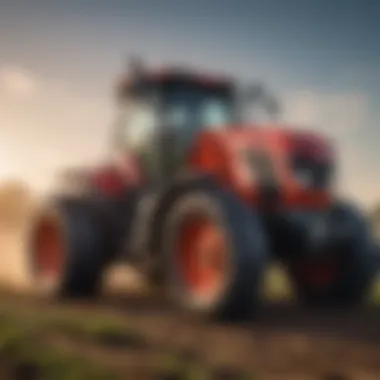
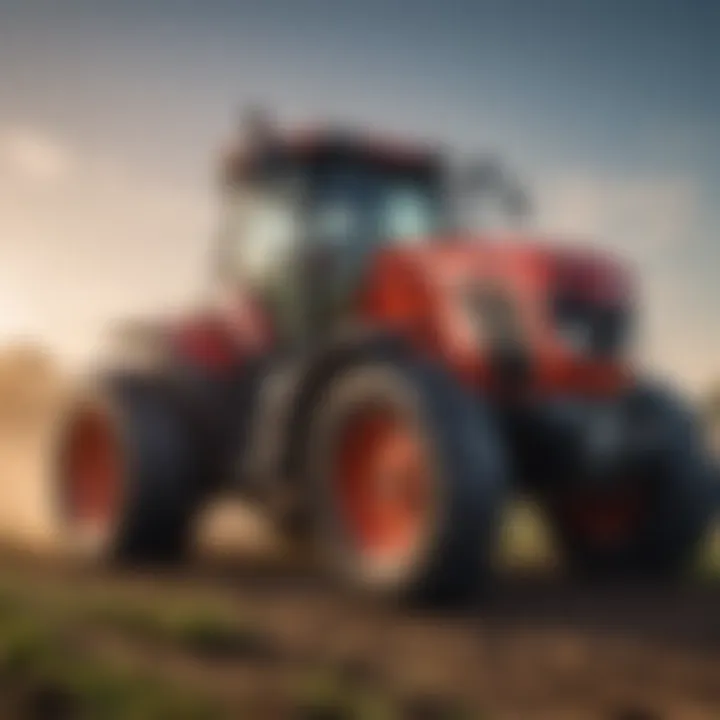
Intro
Agriculture is not just a back-to-basics notion; it's a complex tapestry woven together by technology, market dynamics, and the perpetual drive toward sustainability. As farming methods evolve, the machinery used to enhance productivity has become equally sophisticated. But who plays an essential role in the facilitation of this machinery? Enter the farm machinery traders, a pivotal link between innovative equipment manufacturers and the ever-demanding needs of farmers.
These traders do more than simply sell equipment; they embody the guidance and support that modern agriculture often necessitates. This article seeks to explore their crucial contributions, from broad market trends and technological advancements to the heart of operational farming techniques that bolster both efficiency and sustainability.
Current Trends in Agriculture and Horticulture
The agricultural landscape is in constant flux, with new challenges and opportunities emerging almost daily. To keep pace, farm machinery traders must stay ahead of the curve, understanding current trends that influence farmers' choices.
Overview of Recent Innovations
In recent years, innovations in farm machinery have surged forward. Technologies like automated tractors, precision farming tools, and smart irrigation systems are altering farming paradigms. For instance, John Deere has introduced tractors that integrate GPS technology for precision field mapping.
Moreover, the rise of eco-friendly machinery cannot be ignored. Electric tractors are increasingly gaining traction, offering a renewable solution to fuel consumption. As environmental sustainability takes center stage, machinery traders play a vital role in connecting farmers with these advanced tools.
Sustainable Practices Gaining Popularity
With climate change at the forefront, sustainable practices are not just trending; they are essential. Farmers are adopting methods such as no-till farming and crop rotation, and machinery traders are stepping up to provide appropriate solutions. Here’s a closer look at these practices:
- No-till Farming: This technique reduces soil erosion and enhances water retention. Traders provide specialized no-till planters that adapt to various soil conditions.
- Cover Cropping: This involves planting crops that improve soil health during off-seasons. Traders assist farmers by recommending the right seed varieties necessary for success.
"The shift towards sustainable farming is not just a trend; it's a necessity as our planet faces unprecedented changes. Traders are crucial in making this shift seamless for our farmers."
Essential Farming Techniques
As technology advances, essential farming techniques are further refined, providing farmers with effective ways to manage their operations. Understanding these techniques allows farm machinery traders to offer tailored solutions to meet farmers' needs.
Soil Health Management
Healthy soil is the foundation of productive farming. Approaches such as using microbial inoculants, composting, and soil testing are gaining favor among farmers.
- Microbial Inoculants: These additives support soil health by improving nutrient uptake. Traders often provide education on how and when to use these inoculants effectively.
- Regular Soil Testing: Traders frequently collaborate with agronomists to educate farmers about soil testing, enabling them to make informed decisions on nutrient application.
Pest and Disease Control Strategies
The battle against pests and diseases continues to challenge farmers. Integrated pest management (IPM) practices, combined with advanced machinery, help in effectively tackling this issue.
- Biological Control: Utilizing natural predators to control pest populations is an approach where traders can offer specific machinery that aids in applying these biological agents effectively.
- Precision Spraying Technology: Equipment with precision spray technology lessens pesticide usage, which is vital for sustainable farming.
Tools and Technology in Farming
In the quest for more efficient farming methods, traders bridge the gap between technological advances and farmer usability.
Overview of Advanced Farming Tools
Traders are now familiar with a suite of advanced tools meant to enhance efficiency. From drones capable of monitoring crop health to autonomous vehicles that can plow and seed, these technologies signal a significant shift in farming practices.
Case Studies on the Use of Technology
One notable case involves a mid-sized farm in the Midwest that adopted autonomous tractors. By integrating these tractors into their operations, they reported a 20% increase in productivity while reducing operational costs. This success story exemplifies how farm machinery traders can facilitate the adoption of technology, thus creating tangible benefits for farmers.
In the ever-evolving realm of agriculture, the role of farm machinery traders cannot be understated. These traders not only enhance the efficiency and sustainability of farming practices, but they also adapt to the diverse needs of the farmers they serve. As we continue to navigate this dynamic landscape, their contributions will surely shape the future of modern agriculture.
Prelude to Farm Machinery Trading
In the landscape of modern agriculture, the role of farm machinery trading cannot be understated. These traders serve as the critical link between manufacturers and farmers, facilitating access to an array of equipment that shapes farming practices today. Given the rapid advancements in agricultural technology, understanding this sector is essential for both farmers and enthusiasts looking to optimize productivity and sustainability.
Traders do not merely sell machinery; they provide valuable insights and guidance that influence farmers' decisions on the best equipment for their specific needs. This goes beyond simply offering options—it's about equipping farmers with tools that can enhance yield, streamline operations, and ultimately impact profitability.
Defining Farm Machinery Trading
Farm machinery trading involves the commerce related to agricultural tools and equipment that aid in farming activities. This includes everything from tractors and harvesters to seeders and irrigation systems. Trades take place on various platforms, such as dealerships, online marketplaces, and agricultural expos.
A key aspect of farm machinery trading is its multifaceted nature. Traders engage with manufacturers to source cutting-edge technology while simultaneously addressing the needs of farmers. This role requires an understanding of farming methods, machinery specifications, and market trends.
Historical Context and Evolution
The evolution of farm machinery trading mirrors the broader technological advancements within the agriculture sector. Historically, farming equipment was rudimentary, often handmade or locally sourced. As farms grew larger and the demand for productivity increased, the need for specialized machinery arose.
The Industrial Revolution marked a significant turning point, introducing mechanized tools that transformed farming practices. Over the decades, machinery trading evolved into an organized sector, with dealers becoming more knowledgeable and adaptive to changes in farming technology. Today, we see a sophisticated network of traders who must stay abreast of innovations like precision agriculture and automation.
In summary, the role of farm machinery traders has transitioned from mere suppliers to trusted advisors and partners in farming ventures. Their understanding of both the equipment landscape and the specific challenges faced by farmers is invaluable in fostering a productive agricultural environment.
The Importance of Farm Machinery in Agriculture
In the landscape of modern agriculture, machinery plays a pivotal role. It's not just about digging and planting anymore; it's about optimizing outputs while minimizing labor and time. The importance of farm machinery cannot be overstated. These tools transform traditional farming practices into high-tech operations that cater to today’s demands for food production. As farmers face new challenges ranging from climate change to food security, efficient machinery becomes even more crucial.
One might say the heartbeat of successful agriculture lies in the effectiveness of its machinery. With the right tools, farmers can enhance productivity, improve harvesting efficiency, and manage large tracts of land with ease. These machines do the heavy lifting, allowing farmers to focus their expertise where it’s needed most — on growing healthy crops and sustaining livestock.
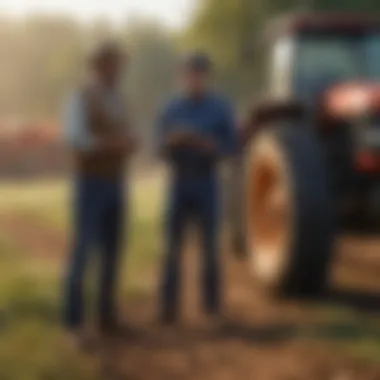
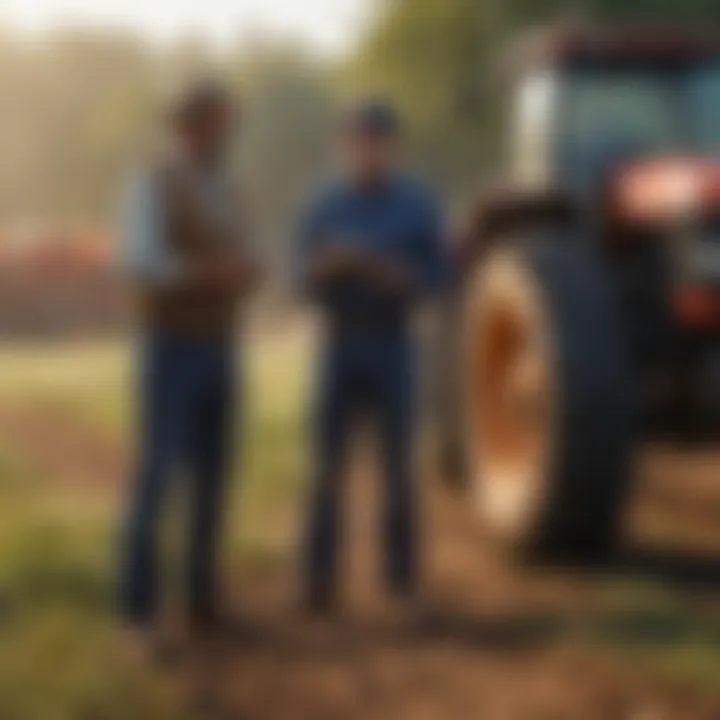
Enhancing Productivity through Technology
The advent of technology in farm machinery has been nothing short of revolutionary. Advanced tractors equipped with GPS, automated systems, and cutting-edge sensors push the boundaries of what farmers can achieve. Think of a farmer equipped with a John Deere 8R series tractor; it can plant, fertilize, and harvest with minimal human intervention. These tractors are designed to cover more ground in lesser time with unmatched precision.
- Precision Agriculture: This includes technologies that allow farmers to operate with pinpoint accuracy. With that precision, inputs such as fertilizers and pesticides can be used more strategically, reducing waste and saving money.
- Data-Driven Decisions: Farmers can analyze data collected by these smart machines to evaluate crop health, soil conditions, and even weather patterns. This empowers them to make informed decisions, leading to higher yields and better quality produce.
Moreover, robotic harvesters are increasingly commonplace. They operate tirelessly, often outperforming human labor in terms of speed and consistency, which is crucial during peak harvest periods. No one wants to lose a season’s worth of fruit simply because they couldn't keep up with the demand. Machines ensure that every berry is picked at just the right moment, maximizing both quality and quantity.
Sustainability and Efficiency
As farmers grapple with sustainability, the role of machinery traders becomes ever more critical. Modern machinery is designed for efficiency — both in terms of energy and resource use. For instance, equipment that uses less fuel not only lowers operational costs but also lessens the carbon footprint. This aligns well with the increasing consumer demand for sustainably sourced products.
- Reduced Soil Compaction: Innovations in machinery help mitigate soil compaction, preserving the health of the land and ensuring that crops can thrive year after year. Lighter equipment makes a significant difference.
- Water Conservation: Systems integrated with irrigation machinery can now utilize rainwater and recycle water more efficiently, promoting judicious use of this precious resource.
In a world where consumer preferences gravitate toward eco-friendly products, efficient machinery serves as a fundamental pillar in the sustainability movement. As technology evolves, it’s not just about machinery trading; it’s about creating a more sustainable agricultural framework that benefits farmers, consumers, and the planet.
"Machinery is not just about efficiency; it’s the backbone of modern agriculture’s response to the challenges of our time."
All these elements underline the importance of farm machinery in agriculture today. In the fast-paced environment of modern farming, machinery is no longer a luxury but a necessity, leading the way toward innovative agricultural practices that meet the demands of a growing population.
Types of Farm Machinery in Trade
When looking at the agricultural landscape, one cannot overlook the significance of farm machinery types. They serve as the backbone of farming operations, enabling farmers to optimize their work, increase yield, and maintain sustainability. Farm machinery traders are the key players in ensuring that farmers have access to the right tools. It isn't just a matter of selling machines; it’s about understanding their functionalities and how they align with specific farming needs.
Tractors and Plowing Equipment
Tractors are often referred to as the workhorses of the farm. Their versatility is unmatched, as they're used for various tasks, from plowing and tilling to planting and hauling. When farmers seek machinery, tractors come to the forefront, and for good reason.
Tractors come in different sizes and horsepower ratings, tailored for various farming scopes. A small farmer might prefer a compact tractor for field work, while larger operations might require heavy-duty tractors capable of handling significant attachments. Plowing equipment, attached to these tractors, is equally crucial. For instance, disc plows or moldboard plows are designed to turn the soil, enabling better soil aeration and preparation for planting.
"The right tractor and plow combination can mean the difference between a thriving crop and a failed one."
Farm machinery traders play an integral role in advising farmers on the best equipment for their unique situations. Considerations such as soil type, crop species, and the field’s geographical layout are vital. Understanding these elements helps farmers not only invest wisely but also operate their machinery efficiently, ensuring minimal wear and tear.
Harvesting Machinery
Harvesting machinery stands at the end of the agricultural cycle. It includes combines and harvesters that significantly reduce manual labor and time needed to gather crops, especially in large fields. The advancement in technology has introduced mechanized harvesting, which has revolutionized the way crops are collected.
Traders specializing in harvesting machinery have a responsibility to educate farmers on the features and benefits of different types of harvesters. For instance, choosing between a rotary harvester and a conventional one can affect both efficiency and speed. The right machinery can lead to faster harvest times, alleviating worries about weather changes that could spoil crops
It’s essential for traders to understand the local crop types and harvesting methods employed by farmers. This knowledge allows them to recommend machinery that enhances both productivity and profitability.
Planting and Cultivating Tools
Planting and cultivating tools are the unsung heroes of the farming process. Tools like seed drills, planters, and cultivators are essential in ensuring that crops are sown accurately and cultivated effectively. These machines help in covering seeds adequately, reducing the risk of pests and improving germination rates.
Farm machinery traders must explain the advantages of using precision planting tools, which enable farmers to plant at optimal depths and spacing. Such precision can lead to better crop stands, and ultimately, higher yields.
Additionally, cultivators that work the soil post-planting contribute to weed management and nutrient distribution throughout the crop's lifecycle. Traders must also address maintenance practices for these tools, ensuring farmers are equipped not only with the machine but also with the knowledge to keep them running smoothly.
The Market Dynamics of Machinery Trading
The machinery trading market operates within a complex web of factors that influence both supply and demand. Understanding these dynamics is pivotal, as they not only drive the prices of equipment but also determine accessibility for farmers. In agriculture, the role of machinery traders is integral in linking manufacturers with end-users, ensuring a seamless flow from production to application in the fields.
Understanding Supply and Demand
Supply and demand serve as the heartbeat of the machinery trading landscape. To grasp this concept, think of it as a scale; on one side sits the supply of machinery, including everything from tractors to advanced harvesting machines, while on the other lies the demand from farmers aiming for efficiency and sustainability.
When demand for innovative machinery spikes due to trends like increasing crop yields or sustainability practices, supply chains must react swiftly. A glaring example is the growing interest in precision farming technologies. As farmers seek machinery that can provide data-driven insights, traders must be versatile, sourcing the latest equipment to meet these needs.
Conversely, during economic downturns or shifts in agricultural production methods, demand may plummet, leading to a surplus in machinery. This dynamic creates pressure on prices and can compel traders to adjust their inventory strategies. For those in the business, keeping a finger on the pulse of market fluctuations is key to navigating these waters effectively.
"The relationship between supply and demand is not merely transactional; it’s a dance that requires awareness and adaptability."
Impact of Global Market Trends
Global market trends significantly affect local machinery trading dynamics. For instance, as environmental regulations tighten, there's a collective push towards adopting eco-friendly farm machinery. Conversely, geopolitical events can create ripple effects that interfere with the availability of imported machinery. Recent trade tensions have illustrated this clearly, causing farmers to reconsider their machinery purchases or seek alternative solutions.
Additionally, advancements in technology can sometimes outpace local markets. Take, for example, the rapid evolution of robotics in agriculture. While this might be a boon for certain farmers, traders need to stay ahead of the curve, finding ways to integrate these innovations into their offerings.
Key Considerations
- Regional Variability: Supply and demand can vary drastically based on geographical regions. What works in one area may not necessarily click in another.
- Seasonality: Certain times of the year can see surges in demand, particularly during planting or harvesting seasons. Machinery traders must anticipate these fluctuations to optimize inventory.
- Economic Factors: Interest rates, inflation, and other economic indicators play a crucial role in shaping buying behavior among farmers.
In summary, the market dynamics of machinery trading are interwoven with various forces that directly impact agricultural practices. As traders navigate these waters, flexibility and foresight become invaluable tools for fostering relationships and ensuring that farmers have access to the machinery they need.
Challenges Faced by Farm Machinery Traders
Farm machinery traders stand at the crossroads of innovative technology and the complex landscape of modern agriculture. Their role goes beyond mere transactions; they serve as vital conduits connecting farmers with equipment that can significantly alter their productivity and sustainability. However, this busy intersection is fraught with challenges that can complicate their operations and affect the farmers they aim to support. Understanding these challenges is critical in grasping how traders can adapt to an evolving agricultural environment, and it is essential for farmers to be aware of these hurdles, especially when considering new investments.
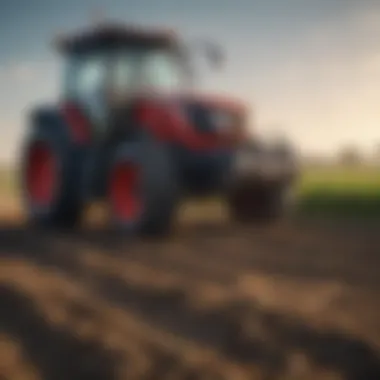
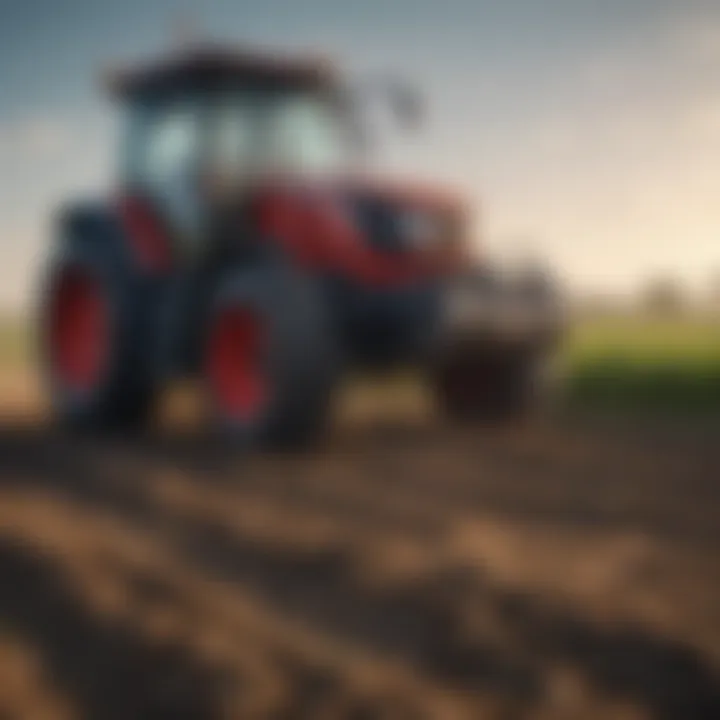
Regulatory Hurdles and Compliance
Navigating regulations is like trying to find a needle in a haystack for farm machinery traders. Compliance with local, national, and sometimes even international laws is a must but can be a headache. The agricultural machinery industry often faces stringent rules pertaining to safety, emissions, and environmental impacts. Regulatory agencies impose these standards to ensure that machinery is safe for both the user and the environment. While regulation can lead to safer equipment, it can also stall the trading process, driving up costs and placing limits on product availability.
Farmers may not grasp the full extent of these regulatory requirements, but traders must educate their clients on what they mean for machinery usage and maintenance. For example, if a new emission law comes into effect, the machinery traders might have to withdraw older models from their portfolio. This situation not only impacts the traders' sales but also the farmers relying on older, potentially less expensive gear.
Traders must keep abreast of changing regulations. Those who fail to comply might face hefty fines or even worse, losing their trading license, which could cripple their business. Regular training and updates can equip traders with the knowledge to navigate this complex maze, benefitting both themselves and their farmer clients in the long run.
Technological Adaptation and Investment
As the agricultural sector continues to mature technologically, machinery traders face the daunting task of adapting to these advancements while ensuring their own operations remain viable. The rise of precision farming tools is a prime example where the line between traditional machinery and cutting-edge technology blurs, leaving users—traders and farmers alike—scrambling to catch up.
Investing in technology can be a double-edged sword. On one side, modern machinery equipped with sensors, data collection tools, and automated systems can significantly boost yields and efficiency. On the other hand, the initial investment can be steep, and many traders may lack the capital to stay competitive. With new tech emerging constantly, traders must decide whether to invest in cutting-edge machinery or older models that are easier to finance. This brings up the crucial conversation of costs versus benefits.
Moreover, many farmers may be hesitant to transition to new technologies due to unfamiliarity, fearing they might end up with a machine that doesn't align with their needs. Traders must act as educators. They should provide demonstrations and information that help farmers see the benefits that new machinery can bring to their operations. In essence, traders not only sell machinery; they guide their clientele toward sustainable and productive farming practices.
"Adapting to change is the name of the game. It can sometimes feel like trying to herd cats, but it's necessary for both traders and farmers to stay relevant in a rapidly shifting landscape."
In summary, the challenges that farm machinery traders face—be it through regulatory hurdles or the demand for technological adaptation—are both intricate and interdependent. A comprehensive understanding of these challenges will not only aid traders in navigating their business models but also serve as a wake-up call for farmers looking to optimize their yield and sustainability.
Selecting the Right Equipment
Choosing the appropriate farm machinery is pivotal for enhancing agricultural productivity and sustainability. A well-thought-out selection process can lead to increased efficiency in farming operations, reduced labor costs, and better crop yields. The impact of machinery on farm operations cannot be overstated; hence this section delves into the consideration farmers must observe before making their choices.
Assessing Field Requirements
Before diving into purchases, farmers must first comprehend their specific field requirements. Different soil types, crop varieties, and land sizes necessitate distinct machinery characteristics. For instance, a farmer with heavy clay soil might require a robust tractor coupled with plowing equipment that can efficiently break up the dense earth. On the other hand, those tending to sandy soil may prioritize equipment that allows for rapid drainage
It's useful to analyze the following aspects:
- Soil Conditions: Understanding soil type helps determine machinery, like tillers or plows, to improve soil health.
- Farm Size: Large-scale farms might need more versatile and powerful machinery to cover expansive fields quickly.
- Crop Diversity: Different crops require different equipment; for example, you wouldn't use the same harvester for corn as you would for wheat.
- Terrain: Steep or uneven land often demands specialized machinery, like hillside tractors, to ensure safety and efficacy.
Farmers should take an inventory of their fields and assess each crop's growing conditions alongside. This evaluation aids in crafting a targeted plan, ensuring that the machinery selected aligns with operative needs.
Evaluating Costs versus Benefits
When it comes to equipping a farm, cost is often a major concern, but it's essential not to lose sight of the long-term benefits that can arise from the right investment. Evaluating the costs versus benefits of farm machinery involves a nuanced analysis that takes multiple factors into consideration:
- Initial Outlay: The upfront cost is usually what first comes to mind. Consider whether it's possible to lease equipment, which can sometimes ease the financial burden.
- Operational Costs: This encompasses fuel consumption, maintenance expenses, and replacement parts. More efficient machines often equate to lower operational costs over time.
- Productivity Gains: Investing in modern machinery can lead to higher productivity levels, enabling a farmer to increase output with less labor.
- Longevity and Resale Value: Some farm machines deteriorate faster than others. It’s worth considering the machine's lifespan and its expected resale value.
"An effective investment today could lead to vast savings tomorrow; make informed choices!"
Finding an equilibrium between cost and benefit is crucial. Detailed cost analysis templates, possibly available through Wikipedia, can provide calculators and guidelines.
Ultimately, the best machinery does not come merely from trendiness or brand names, but from a comprehensive analysis of specific needs combined with a clear understanding of the cost-to-benefit ratio.
Machinery Maintenance and Upkeep
Machinery maintenance and upkeep play a pivotal role in ensuring the long-term performance and efficiency of farm equipment. In the fast-paced world of modern agriculture, where productivity and cost efficiency are paramount, neglecting maintenance can lead to dire consequences. Hence, for farm machinery traders, understanding the significance of maintenance is just as crucial as the trading aspect itself. Regularly maintaining machinery not only prolongs its lifespan but also enhances operational efficiency, thereby minimizing downtime during critical farming seasons.
Proper upkeep can prevent larger, costlier repairs down the line. A well-maintained piece of equipment operates smoothly, which can improve yields and reduce fuel costs. With the rising complexity of agricultural machinery, requiring specific knowledge and skills for repairs, it’s vital for traders to offer not just equipment but also a comprehensive understanding of maintenance practices.
"An ounce of prevention is worth a pound of cure."
As traders guide farmers in selecting appropriate machinery, they should emphasize the benefits of maintaining equipment regularly. This ensures that farmers understand that investing in their machinery is similar to investing in the very crops they sow. Below, we detail routine maintenance practices and common issues for machinery users to keep in mind.
Routine Maintenance Practices
Implementing a schedule for routine maintenance can keep machinery in top condition. Here are key practices that farmers should adopt:
- Daily Inspections: Before operation, farmers should check for any visible irregularities, such as leaking oil or loose parts.
- Lubrication: Regularly lubricating moving parts minimizes friction and prevents wear and tear.
- Filter Changes: Oil and air filters should be changed as per the manufacturer’s recommendations to ensure optimal engine performance.
- Tire Maintenance: Keeping tires properly inflated and checking for wear can enhance fuel efficiency and improve traction.
- Cleaning: Cleaning machinery after use removes debris that may affect operation. For instance, a clean air intake ensures better engine performance.
Consistent adherence to these practices not only prolongs the machinery's life but also fosters a deeper understanding of how each component functions.
Troubleshooting Common Issues
Every farmer knows that even the best-made machinery can face issues. Understanding common problems and their solutions is essential for minimizing downtime. Below are some frequent issues encountered with farm machinery and basic troubleshooting steps:
- Engine Won't Start:
- Uneven Performance:
- Hydraulic Issues:
- Check Fuel Supply: Ensure there’s enough fuel and that it is clean. Contaminated fuel can lead to malfunctions.
- Battery Inspection: Look for corrosion on battery terminals. A weak battery may require recharging or replacement.
- Filter Blockage: Inspect and clean air and fuel filters. Blockages can cause uneven power delivery.
- Tire Pressure: Uneven tire pressure can affect balance and performance, so ensure all tires are adequately inflated.
- Fluid Checks: Low or dirty hydraulic fluid can lead to reduced performance. Check fluid levels and clarity.
- Hose Inspection: Look for cracks or leaks in hoses which could lead to loss of pressure.
Being familiar with these issues allows traders to better support their clients, fostering trust and long-term relationships. Understanding maintenance is not just about repairs; it’s about enabling farmers to achieve optimal performance for their investments in machinery.
Adopting Innovative Technologies
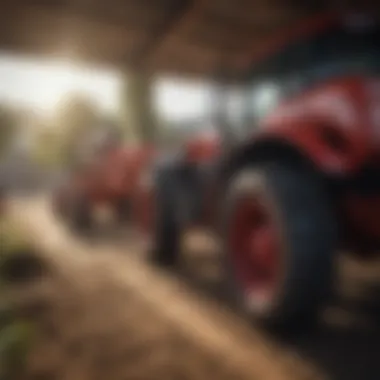
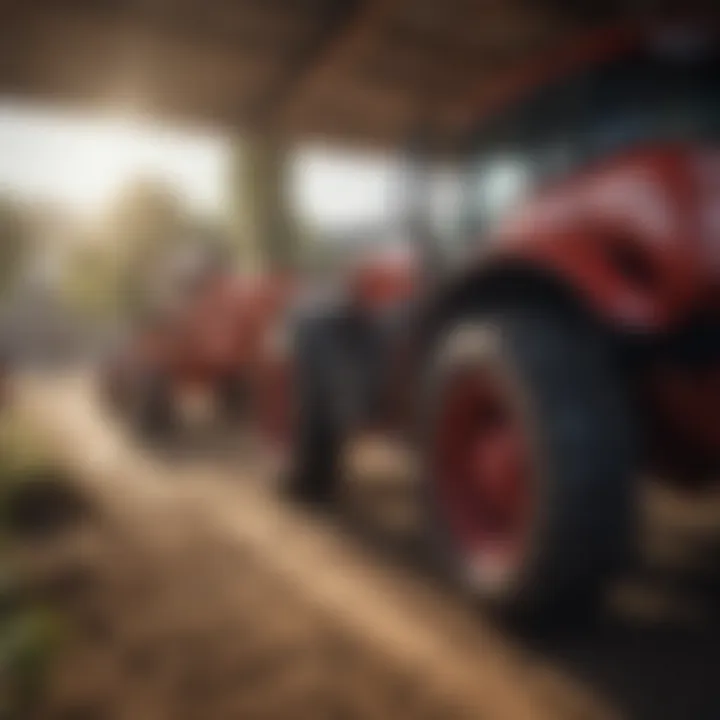
In the modern agricultural landscape, the adoption of innovative technologies is pivotal for enhancing productivity and sustainability. With the pressure to increase yields while minimizing environmental impact, the integration of advanced tools and systems offers farmers a competitive edge. For machinery traders, recognizing and adapting to these innovations not only shapes their business strategies but also impacts the success of their clientele.
Precision Farming Techniques
Precision farming, often called precision agriculture, reflects a detailed understanding of how to optimize field-level management regarding crop farming. This approach hinges on data collection and analysis to make informed decisions.
- Use of Technology: Technologies such as GPS guidance systems help farmers target specific areas for planting or fertilization, ensuring resources are used where most needed. This level of specificity can save farmers both time and money.
- Yield Mapping: By collecting data during harvests, traders can offer machines equipped with mapping technology that shows where crop yields are highest or lowest. This information aids farmers in adjusting their planting strategies for future seasons.
- Variable Rate Technology (VRT): VRT allows farmers to adjust inputs like fertilizers and pesticides based on specific field conditions. This contributes to significant cost savings and reduces environmental impact.
With all this, it’s clear that precision farming is no longer a luxury; it’s becoming a necessity.
Automation and Robotics in Agriculture
Automation and robotics are reshaping how farming is done. From planting to harvesting, these technologies can significantly reduce labor costs and time.
- Autonomous Tractors: Unmanned tractors are capable of operating without constant human oversight. They can work around the clock, ensuring tasks are completed faster with less fatigue.
- Drones: These flying machines can monitor crop health, manage irrigation, and more. They give farmers new insights into their fields without the need to conduct on-foot inspections.
- Robotic Harvesters: For fruits and vegetables, robotic harvesting systems can pick crops more efficiently than human laborers, minimizing waste while optimizing timing and quality.
By incorporating automation and robotics, not only do farmers enhance their operational efficiency, but they also improve the overall quality of their produce.
"The future of farming lies in understanding the potential of technology. It's not just about the machines; it’s about how they can transform our practices for the better."
Farm machinery traders must capitalize on these advancements to help farmers embrace transformation, ensuring that they are equipped with the tools necessary for success.
The Role of Farm Machinery Traders in Supporting Farmers
Farm machinery traders play a pivotal role in modern agriculture, acting as vital links between farmers and the latest agricultural technology. Their contribution goes beyond just selling equipment; they provide essential support that enhances the overall efficiency and productivity of farming operations.
Consultative Approaches to Sales
In the bustling world of agriculture, farm machinery traders often adopt consultative approaches to sales. This means they don’t just push products onto farmers. Instead, they take the time to understand the specific needs of each farmer.
For instance, a farmer may need a tractor not solely for horsepower but for unique field conditions. A trader who listens closely can recommend the right model with the appropriate attachments. This tailored guidance ensures that farmers make informed decisions that directly influence their yield and efficiency.
The consultative approach also fosters a partnership between traders and farmers. When traders establish themselves as trusted advisors, it leads to long-term relationships built on reliability and expertise. This can be particularly beneficial during challenging seasons when timely advice regarding machinery adjustments or upgrades can make all the difference.
Providing After-Sales Support
After a sale is made, the journey doesn’t just end there. Exceptional after-sales support is crucial for farm machinery traders. Farmers often face uncertainties regarding new equipment, such as machinery operational issues and maintenance challenges. Adequate support can alleviate these stresses.
For example, consider a farmer who has recently purchased a combine harvester. Initial confusion about its features can lead to inefficiencies during critical harvest periods. A trader who provides comprehensive training and ongoing support helps ensure the farmer maximizes the harvester's potential.
Traders may also offer maintenance services, which can be hugely advantageous. By scheduling regular check-ups and timely repairs, machinery traders help prevent costly breakdowns, allowing farmers to concentrate on what they do best—growing crops. This proactive care not only saves money but also builds a strong bond of trust between the farmer and the trader.
"A farmer's success today often hinges on the efficiency & reliability of their machinery, making strong partnerships with knowledgeable traders indispensable."
Future Trends in Farm Machinery Trading
In the realm of agriculture, the winds of change blow steadily, shaping the future of farm machinery trading in remarkable ways. Understanding these trends isn't just a passing fancy; it’s essential for staying ahead in a competitive market. Below, we delve into the significant shifts that are molding the landscape of machinery trade, focusing on the very backbone of efficient farming.
Emerging Technologies and Innovations
A noteworthy trend in farm machinery trading is the infusion of emerging technologies. These innovations not only bolster efficiency but also redefine the way farmers interact with machinery. We see a growing adoption of smart machinery, which integrates Internet of Things (IoT) capabilities. For instance, consider tillers equipped with sensors that inform the operator about soil conditions. This data-driven approach enables precise cultivation, optimizing crop yields while conserving resources.
In addition, drones are taking farm management up a notch. Farmers can now monitor crop health, assess irrigation needs, and even spot pest infestations from the sky. The acquisition of such technology requires traders to comprehend the technical specifications and implications deeply, providing the necessary guidance to farmers. Moreover, advancements in electric and autonomous vehicles promise to further innovate the field. However, education on operation and maintenance is paramount for seamless integration.
"The revolution in machinery technology is not just about hardware; it's about creating a holistic ecosystem that supports sustainable farming practices."
Shifting Farmer Preferences and Needs
As the axiom goes, "the customer is always right," and that holds especially true for farmers. Their preferences are evolving, influenced by sustainability concerns, economic pressures, and a drive for increased productivity. Traders must be attuned to these shifting needs. For one, there's a noticeable lean towards eco-friendly machinery. Practitioners are seeking equipment that minimizes environmental impact, such as biofuel-compatible tractors and machinery designed to reduce soil compaction.
Farmers are also looking for versatility in equipment. A multi-functional harvester, for instance, can handle various crops, making it a more worthy investment than specialized equipment. Additionally, the need for user-friendly interfaces is on the rise. The ease of operation can significantly affect productivity, thus influencing purchase decisions.
The landscape of farm machinery trading is ultimately a reflection of the farmers’ desire for innovation paired with practicality. Addressing these evolving tastes not only fortifies customer relations but also ensures the trader's relevance in a fast-paced agricultural arena.
As we step further into this modern era of agriculture, staying ahead of these trends could well be the difference between thriving and merely surviving in the machinery trade.
Closure
The final thoughts on farm machinery trading reflect its indispensable role in modern agriculture. It’s not just about selling equipment; it’s about creating a framework that fuels agricultural efficiency and sustainability. Farm machinery traders serve as the scaffolding that supports the entire agricultural enterprise—helping farmers navigate the complex world of technology, supply, and demand. If we take a closer look, we can see that this profession helps bridge gaps between innovation and application in the field.
Recapitulating Key Insights
In summarizing the essential points discussed earlier:
- Intermediation: Traders create links between manufacturers and farmers, ensuring that the right equipment reaches those who need it.
- Adaptation: They play a crucial role in helping farmers adapt to the ever-changing technological landscape, which is vital for maintaining productivity.
- Support Systems: After-sales support is a key offering that traders bring, thereby fostering a loyal customer base.
- Market Trends: Keeping abreast of market trends allows traders to influence farming practices positively, driving home the point that successful farming hinges on responsive trading.
These insights combine to paint a clear picture of how pivotal farm machinery traders are for the agricultural fabric. They stand as partners in progress, impacting not just individual farms but the agriculture sector at large.
The Path Forward for Traders and Farmers
As we stand at the precipice of a new era in agriculture, both traders and farmers need to recalibrate their strategies in light of emerging challenges and opportunities:
- Leveraging Technology: Incorporating data analytics and precision farming techniques is not an option but a necessity for both parties. Traders need to be well-versed in these areas to provide best-fit solutions.
- Sustainability Initiatives: Both farmers and traders should aim to champion sustainable agricultural practices. This means investing in machinery that minimizes environmental impact while maximizing yield.
- Building Relationships: There is much to gain from fostering stronger ties between traders and farmers. Understanding farmers’ needs on a deeper level can lead to more effective machinery solutions.
- Flexible Business Models: Adapting business models that cater to different types of farmers—from large agribusinesses to small family farms—will be crucial in creating resilience in this competitive market.
Ultimately, the road ahead for farm machinery traders and farmers is intertwined and should be approached with a sense of collaboration and foresight. As technology continues to evolve and resources become more constrained, their role is likely to grow even more critical, shaping the future of the industry for generations to come.



